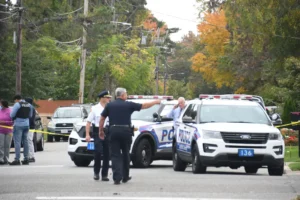The Coordinator of the umbrella organization Dominican@s por Derecho and the Director of the Centro de Desarrollo Sostenible (CEDESO, Center for Sustainable Development), Beneco Enecia requested that Dominican authorities accept the responsibility of finding a definitive solution to the problems Judgment 168/13 has caused tens of thousands of people, particularly as Law 169-14 has still not resolved them.
As part of the presentation of the report “Dreams Deferred: The Struggle of Dominicans of Haitian Descent to Get Their Nationality Back” which Robert F. Kennedy Human Rights, American Jewish World Service and the United Nations Democracy Fund, along with CEDESO, co-authored, Enecia stated that “nationality is a Dominican issue and it deserves solutions from the Dominican authorities and institutions.”
This report was presented on Friday, October 6th during a ceremony at Hotel Lina, with civil society representatives, intergovernmental organizations, media, and citizens of communities affected by Judgment 168/13 in attendance.
“The Constitutional Tribunal’s Judgment 168/13 denationalized hundreds of thousands of persons of Haitian descent (…) Generations of people that were born in the country between 1929 and 2010. This judgment violates international law and the Dominican Constitution itself, in addition to violating one of the most fundamental legal principles, the non-retroactivity of the law,” Beneco Enecia continued.
He invited Dominican authorities to join civil society in an open and responsible dialogue with political will, with the aim to work together to seek a lasting solution to the denationalization “that puts our country at the center of an unprecedented situation of statelessness in the region.”
“I know that for many Dominicans and friends, the problem should be solved, however civil society organizations and those affected have demonstrated that this ‘special law’ is insufficient and has delayed the dream of more than 90 percent of those who were denationalized, affecting their ability to enjoy their rights to education, health, stable employment, and above all “a name and a nationality,” he added.
Multiple obstacles
On behalf of Robert F. Kennedy Human Rights and American Jewish World Service, Ms. Amber Lynn Munger said that “along with CEDESO and the support of UNDEF, we drafted this report to maintain the focus on the violations to the right to nationality in the Dominican Republic.”
She added that “those interviewed identify 10 obstacles to receiving documents under Law 169-14, including discriminatory treatment by Dominican authorities and the Dominican police and the economic difficulties in obtaining documentation as well as six of the most serious consequences of not having identity documents, including the inability to register their children as citizens and find formal and stable work.”
She also said that “four years after Judgment 168/13 and more than three years after Law 169-14, the situation continues to be urgent for the majority of those affected,” and in this sense, the report strives to present “the whole report of the constitutional amendments and State policies that culminated in Judgment 168/13 and its devastating consequences, as well as an analysis of the human rights violations that have been and continue to be a problem and, above all, we seek to ensure that those affected are able to tell their own stories.”
Depression, helplessness, exclusion
The filmmaker, journalist, and investigator Juan Carlos González is also a coauthor of the report, and he stated that the most relevant finding to come out of the interviews with those affected was that not being able to access Dominican documents and the right to nationality was based on being black or of Haitian descent or living in poverty.
“The JCE [Junta Central Electoral or Central Electoral Board] has been ineffective in communicating the status of their documentation to those affected in Group A. Those in charge of enforcing Law 169-14 continue to use arbitrary criteria, demanding from those affected requirements that are not in the law to be able to get their documents and they use racist and xenophobic arguments to verbally abuse them,” stated the investigator, referring to the facts presented in the report.
The report concludes that Law 169-14 has not resolved the situation of access to documents or the ability to reap the benefit of Dominican nationality, and that the Junta Central Electoral [JCE] reinterpreted the law, creating additional requirements that were not included in the rules of application of the law, delaying the process of handing over documents, in addition to creating a new form of segregation of persons.
“The impact on the lives of those affected by this problem varies from the administrative to the least visible: depression, helplessness, exclusion, fear, to stigmatization by the security forces of the State and resignation,” added Juan Carlos González.
The report ends with a series of recommendations that range from meetings with government agencies, the elimination of the Transcription Book, efforts to strengthen the media’s treatment of the topic and amplifying the ability of groups of the population affected by Sentence 168/13 to speak out.




